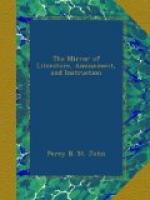* * * * *
SAVINGS’ BANKS.
According to a Parliamentary Return just printed, the gross amount of sums received on account of savings’ banks is, since their establishment in 1817, 20,760,228l. Amount of sums paid, 5,648,338l. The balance therefore is, 15,111,890l. It also states that the gross amount of interest paid and credited to savings’ banks by the commissioners for the reduction of the national debt is, 5,141,410l. 8s. 7d.—Ibid.
* * * * *
SOAP.
According to the Parliamentary Returns, the quantity of soap charged with the excise duty in great Britain, in the year ending the 5th of January, 1830, was—of hard soap, 103,041,961 lbs.; of soft soap, 9,068,918 lbs. In the year ending the 5th of January last, the quantity was—of hard, 117,324,320 lbs.; and of soft, 10,209,519 lbs. The number of licenses granted to soap-makers in the United Kingdom in the former year was 585, and in the latter 542.—Ib.
* * * * *
AUTOGRAPHS.
[Illustration: AUTOGRAPHS.]
We have the pleasure of resuming these innate illustrations of genius. Some of the present specimens are copied from the plate appended to the Edinburgh Literary Journal, whence the page in No. 478 of the Mirror was taken. First is
LEIGH HUNT.—Leigh Hunt’s writing is a good deal like the man: it is constrainedly easy, with an affectation of ornament, yet withal a good hand. The signature is copied from a letter written to a friend in Edinburgh, in 1820; and as one part of this letter is curious and interesting, we have pleasure in presenting it to our readers. We are inclined to believe that there are many good points about Leigh Hunt. We like the spirit of the following extract from his letter:—
“And this reminds me to tell you, that I am not the author of the book called the Scottish Fiddle, which I have barely seen. The name alone, if you had known me, would have convinced you that I could not have been the author. I had made quite mistakes enough about Sir Walter, not to have to answer for this too. I took him for a mere courtier and political bigot. When I read his novels, which I did very lately, at one large glut (with the exception of the Black Dwarf, which I read before), I found that when he spoke so charitably of the mistakes of kings and bigots, he spoke out of an abundance of knowledge, instead of narrowness, and that he could look with a kind eye also at the mistakes of the people. If I still think he has too great a leaning to the former, and that his humanity is a little too much embittered with spleen, I can still see and respect the vast difference between the spirit which I formerly thought I saw in him, and the little lurking contempts




